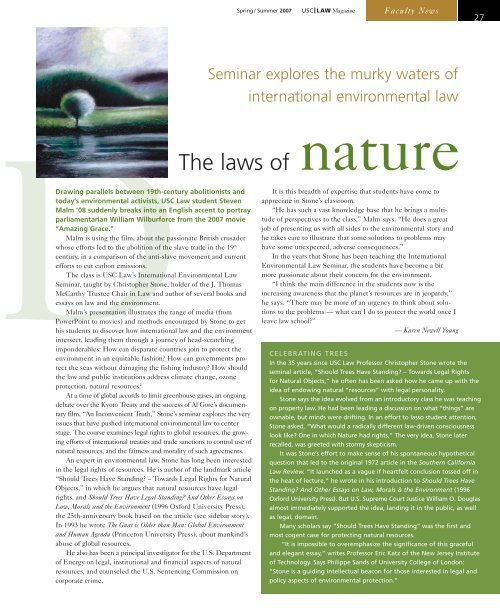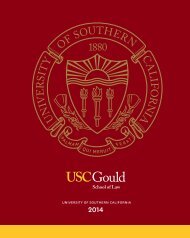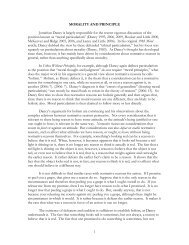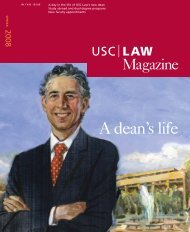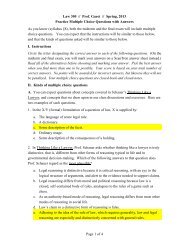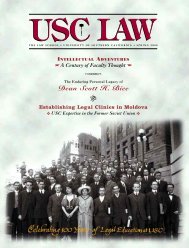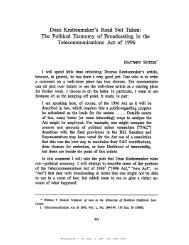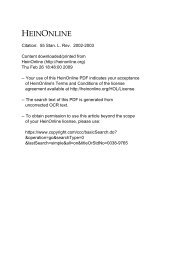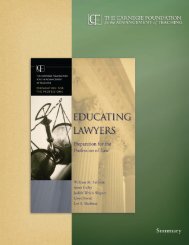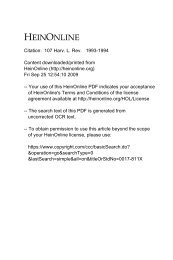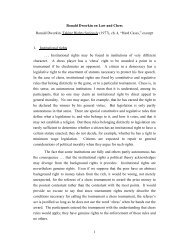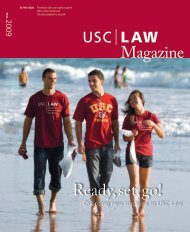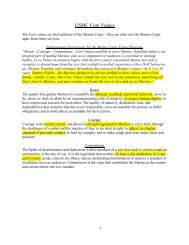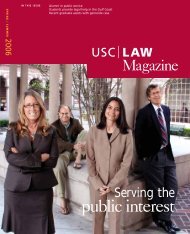Redemption - USC Gould School of Law - University of Southern ...
Redemption - USC Gould School of Law - University of Southern ...
Redemption - USC Gould School of Law - University of Southern ...
- No tags were found...
You also want an ePaper? Increase the reach of your titles
YUMPU automatically turns print PDFs into web optimized ePapers that Google loves.
Spring / Summer 2007MagazineFaculty News27Seminar explores the murky waters <strong>of</strong>international environmental lawThe laws <strong>of</strong> natureDrawing parallels between 19th-century abolitionists andtoday’s environmental activists, <strong>USC</strong> <strong>Law</strong> student StevenMalm ’08 suddenly breaks into an English accent to portrayparliamentarian William Wilburforce from the 2007 movie“Amazing Grace.”Malm is using the film, about the passionate British crusaderwhose efforts led to the abolition <strong>of</strong> the slave trade in the 19 thcentury, in a comparison <strong>of</strong> the anti-slave movement and currentefforts to cut carbon emissions.The class is <strong>USC</strong> <strong>Law</strong>’s International Environmental <strong>Law</strong>Seminar, taught by Christopher Stone, holder <strong>of</strong> the J. ThomasMcCarthy Trustee Chair in <strong>Law</strong> and author <strong>of</strong> several books andessays on law and the environment.Malm’s presentation illustrates the range <strong>of</strong> media (fromPowerPoint to movies) and methods encouraged by Stone to gethis students to discover how international law and the environmentintersect, leading them through a journey <strong>of</strong> head-scratchingimponderables: How can disparate countries join to protect theenvironment in an equitable fashion? How can governments protectthe seas without damaging the fishing industry? How shouldthe law and public institutions address climate change, ozoneprotection, natural resources?At a time <strong>of</strong> global accords to limit greenhouse gases, an ongoingdebate over the Kyoto Treaty and the success <strong>of</strong> Al Gore’s documentaryfilm, “An Inconvenient Truth,” Stone’s seminar explores the veryissues that have pushed international environmental law to centerstage. The course examines legal rights to global resources, the growingefforts <strong>of</strong> international treaties and trade sanctions to control use <strong>of</strong>natural resources, and the fairness and morality <strong>of</strong> such agreements.An expert in environmental law, Stone has long been interestedin the legal rights <strong>of</strong> resources. He is author <strong>of</strong> the landmark article“Should Trees Have Standing? – Towards Legal Rights for NaturalObjects,” in which he argues that natural resources have legalrights, and Should Trees Have Legal Standing? And Other Essays on<strong>Law</strong>, Morals and the Environment (1996 Oxford <strong>University</strong> Press),the 25th-anniversary book based on the article (see sidebar story).In 1993 he wrote The Gnat is Older than Man: Global Environmentand Human Agenda (Princeton <strong>University</strong> Press), about mankind’sabuse <strong>of</strong> global resources.He also has been a principal investigator for the U.S. Department<strong>of</strong> Energy on legal, institutional and financial aspects <strong>of</strong> naturalresources, and counseled the U.S. Sentencing Commission oncorporate crime.It is this breadth <strong>of</strong> expertise that students have come toappreciate in Stone’s classroom.“He has such a vast knowledge base that he brings a multitude<strong>of</strong> perspectives to the class,” Malm says. “He does a greatjob <strong>of</strong> presenting us with all sides to the environmental story andhe takes care to illustrate that some solutions to problems mayhave some unexpected, adverse consequences.”In the years that Stone has been teaching the InternationalEnvironmental <strong>Law</strong> Seminar, the students have become a bitmore passionate about their concern for the environment.“I think the main difference in the students now is theincreasing awareness that the planet’s resources are in jeopardy,”he says. “There may be more <strong>of</strong> an urgency to think about solutionsto the problems — what can I do to protect the world once Ileave law school?”— Karen Newell YoungCELEBRATING TREESIn the 35 years since <strong>USC</strong> <strong>Law</strong> Pr<strong>of</strong>essor Christopher Stone wrote theseminal article, “Should Trees Have Standing? – Towards Legal Rightsfor Natural Objects,” he <strong>of</strong>ten has been asked how he came up with theidea <strong>of</strong> endowing natural “resources” with legal personality.Stone says the idea evolved from an introductory class he was teachingon property law. He had been leading a discussion on what “things” areownable, but minds were drifting. In an effort to lasso student attention,Stone asked, “What would a radically different law-driven consciousnesslook like? One in which Nature had rights.” The very idea, Stone laterrecalled, was greeted with stormy skepticism.It was Stone’s effort to make sense <strong>of</strong> his spontaneous hypotheticalquestion that led to the original 1972 article in the <strong>Southern</strong> California<strong>Law</strong> Review. “It launched as a vague if heartfelt conclusion tossed <strong>of</strong>f inthe heat <strong>of</strong> lecture,” he wrote in his introduction to Should Trees HaveStanding? And Other Essays on <strong>Law</strong>, Morals & the Environment (1996Oxford <strong>University</strong> Press). But U.S. Supreme Court Justice William O. Douglasalmost immediately supported the idea, landing it in the public, as wellas legal, domain.Many scholars say “Should Trees Have Standing” was the first andmost cogent case for protecting natural resources.“It is impossible to overemphasize the significance <strong>of</strong> this gracefuland elegant essay,” writes Pr<strong>of</strong>essor Eric Katz <strong>of</strong> the New Jersey Institute<strong>of</strong> Technology. Says Philippe Sands <strong>of</strong> <strong>University</strong> College <strong>of</strong> London:“Stone is a guiding intellectual beacon for those interested in legal andpolicy aspects <strong>of</strong> environmental protection.”


